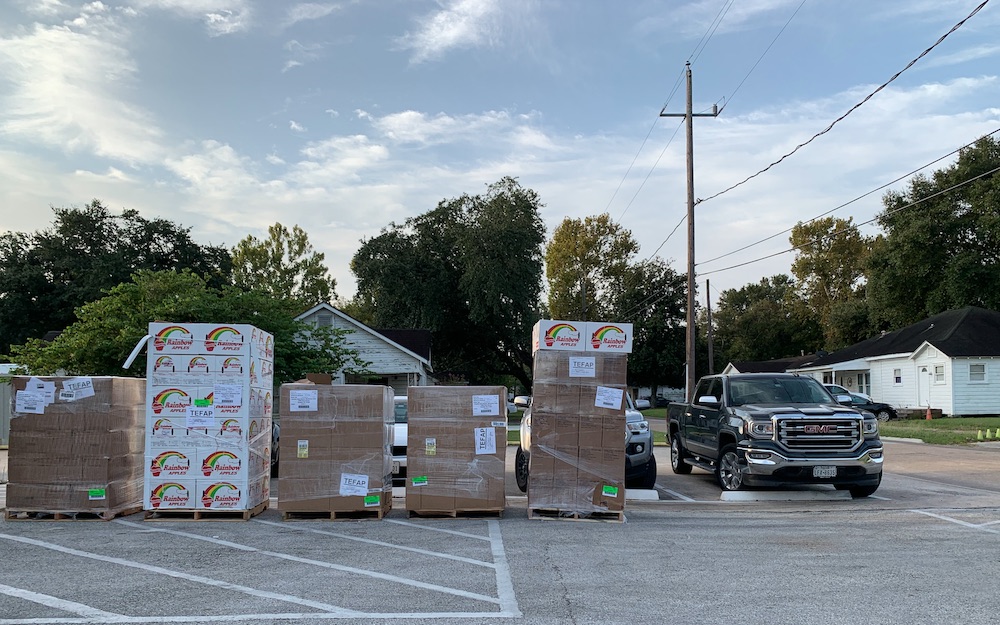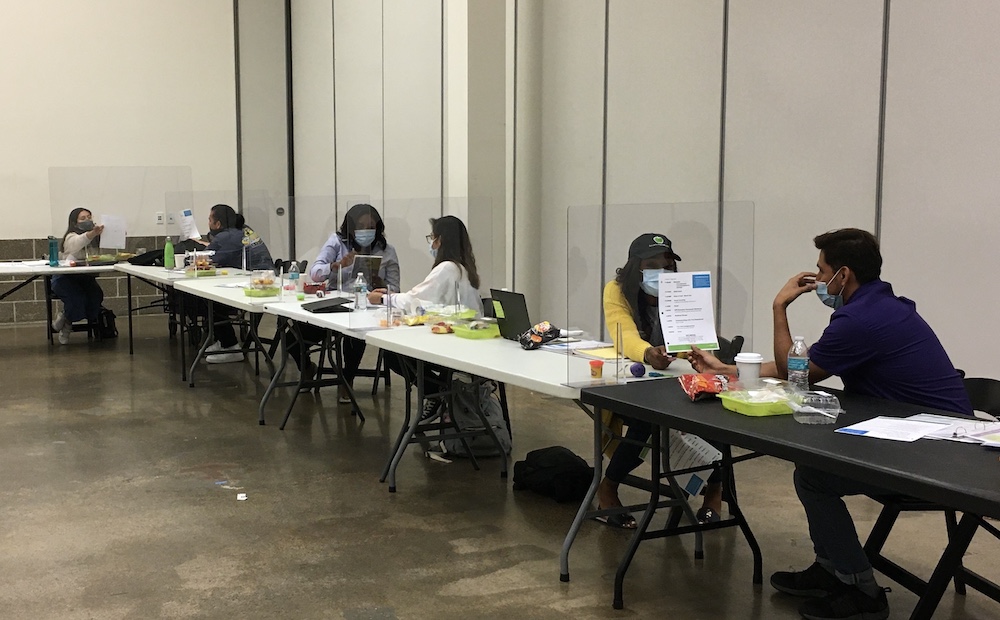Above: Leslie Rios, 27th Class Emerson National Hunger Fellow, at her placement with the Houston Food Bank.
I had only been to Houston a handful of times before I learned my field placement assignment would be the Houston Food Bank (HFB). I was excited to relocate and learn more about a community almost twice the size of the Rio Grande Valley, my hometown, and Austin, where I went to college.
In 2018, Feeding America estimated that Harris County, where Houston is located, had 682,659 people experiencing food insecurity. Currently, HFB serves 1,500 partners across Southeast Texas and has seen a 112% increase in households served each week due to COVID-19.1 In response to this public health crisis, HFB is operating in disaster mode and, on our highest days, has distributed about 1 million pounds of food. The last major disaster that affected the community this greatly was Hurricane Harvey in 2017. Additionally, HFB has continued to provide application assistance for the Supplemental Nutrition Assistance Program (SNAP), Pandemic-EBT, and Medicaid through our Community Assistance Program, collaborated with schools to help provide meals, and provided health-related and economic opportunities through our Food for Change department.
During my first few weeks, I was instructed to learn and absorb as much as I could about different departments and initiatives. I attended a neighborhood super site at NRG Stadium (which are mass drive-thru food distributions) to volunteer and distribute census information, which was my first experience seeing HFB working directly with our Houston community. The neighborhood super sites have become key in making sure HFB gets food into peoples’ homes. I also had the opportunity to meet some of our distribution partners by going on a ride-along with an HFB driver. I witnessed their day-to-day routine, as well as learned about their life journey and what kept them going every day. I completed virtual informational meetings with departments who are working from home. I learned about their departments and the challenges of working from home while staying connected with the community. After meeting with different personnel, I began to see how passionate everyone was about their work and the role they played to advance HFB’s mission and vision.

A food distribution site at a partner pantry in Houston, Texas.
The HFB community has had to learn how to navigate this overwhelming demand, while at the same time, navigating the everyday challenges the pandemic has placed on everyone outside of work. Yet, they remain committed to not only providing community assistance, but also the internal work within the food bank.
In 2018, HFB began reimagining their strategic goals through a series of focus groups that eventually led to their new mission and vision that works towards the future of food banking. They wanted to no longer just serve the line of people needing food, but also to shorten the line by addressing root causes of hunger. Their new mission, “Food for Better Lives,” and vision, “A world that doesn’t need food banks,” was meant to portray their immediate and long-term goals. Some of the ways they are working towards these goals include advocating for policy change; understanding and working with, not for, people who access our services; developing coalitions and collaborating with our community non-profits; and using food as a catalyst for long-term change2. Revisiting the new mission and vision helped push HFB towards looking beyond what their scale of impact was to understanding what it can be.
In September, the same month I started working in the Advocacy Department, HFB launched the Equity Work Groups, co-facilitated by Melanie Pang, Director of Advocacy, and Analicia Bañales, Advocacy and Equity Specialist and Emerson Fellow alum (’19-’20). This initiative came after Analicia’s Emerson project highlighted the challenges our food bank employees experienced and their lived experiences with food insecurity. The project illuminated areas for growth, and the organization became recommitted to equity in a new way: though it was a project in the making for years, the organization raised salaries so that no member earns less than $15 per hour.
The Equity Work Groups exist to go further into exploring and understanding the ways the food bank lives out its mission and vision not only externally, but internally as well. My supervisor, Melanie, believes that in order to see the change we want to see in our community, we need to see it within our four walls too.
The Equity Work Groups are made up of 36 staff members working in three different groups with representatives from nearly every department, including both leadership and non-leadership staff, and overall exemplifies our demographic make-up. By attending these work groups every month, I have had the opportunity to hear people’s stories and what led them to work at the food bank. People shared their positive experiences as volunteers, how the food bank gave them a second chance, or how at one point they experienced food insecurity or knew of someone who did. Last month, we had a community advocate and activist as a guest speaker, who conveyed the importance of doing healing work with our community, working to remove personal biases, understanding who holds the power and why, and being intentional with our work by looking beyond the surface level and acknowledging what is underneath. For instance, who is showing up at our lines and why? What structures put them there? After several more sessions, these groups will provide organizational recommendations that will work towards addressing internal change. The hope is that this internal transformation of the organization will help guide HFB’s external impact on its journey towards a more equitable and just future.

An Equity Work Group meeting at the Houston Food Bank; Leslie Rios at far left.
My role in the Advocacy Department supplements the conversations that will drive internal change. My project as a Hunger Fellow is to administer an equity organizational assessment to better understand HFB policies and processes and establish a baseline of where the food bank is at in their journey to becoming a more racially equitable organization. The assessment is adapted from the Washington Race Equity & Justice Initiative’s (REJI) organizational toolkit and focuses on organizational commitment, culture, recruitment, hiring and retention of a diverse workforce, developing accountability and partnerships with communities of color and our application of an anti-racism lens. This project will gather input from managers, supervisors, directors, executives, general staff and those in the Equity Work Groups, and will be used to understand gaps that may exist within HFB’s commitment to a diverse, inclusive, more equitable workplace. The assessment feedback will be compiled into a final presentation that will be presented throughout the organization through a series of virtual presentations, and prompt HFB to identify next actionable steps. The hope is that HFB continues working to become a place where people can bring their full selves to work, and where we root decision-making in the community and look deeper into how we can lead through equity.
Over the past few months, I have had the opportunity to learn about the services and initiatives going on at HFB and the role food banks play in anti-hunger work. I have learned how the organization is growing to address root causes, while managing to keep up with the demand brought on by COVID-19. As I reflect on my experience, I am grateful I had the opportunity to hear people’s stories, understand who makes up the food bank and see the early stages of how they hope to catalyze change that will have a positive ripple effect towards the whole organization and the community.
- “Houston Food Bank COVID-19 Response.” https://www.houstonfoodbank.org/wp-content/uploads/2020/08/factsheet_covid19_FY20Cumulative.pdf [↩]
- “The Future of Food Banking.” https://www.houstonfoodbank.org/wp-content/uploads/2018/09/AboutUs_TheFutureofFoodBanking.pdf [↩]

